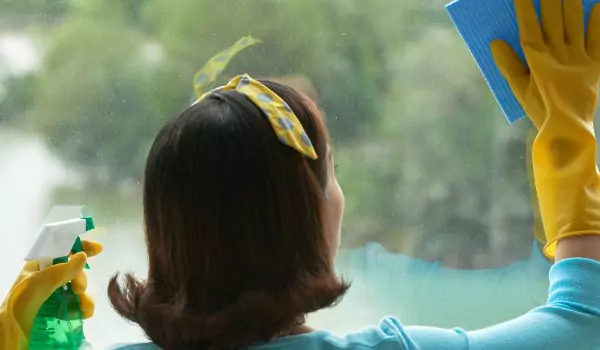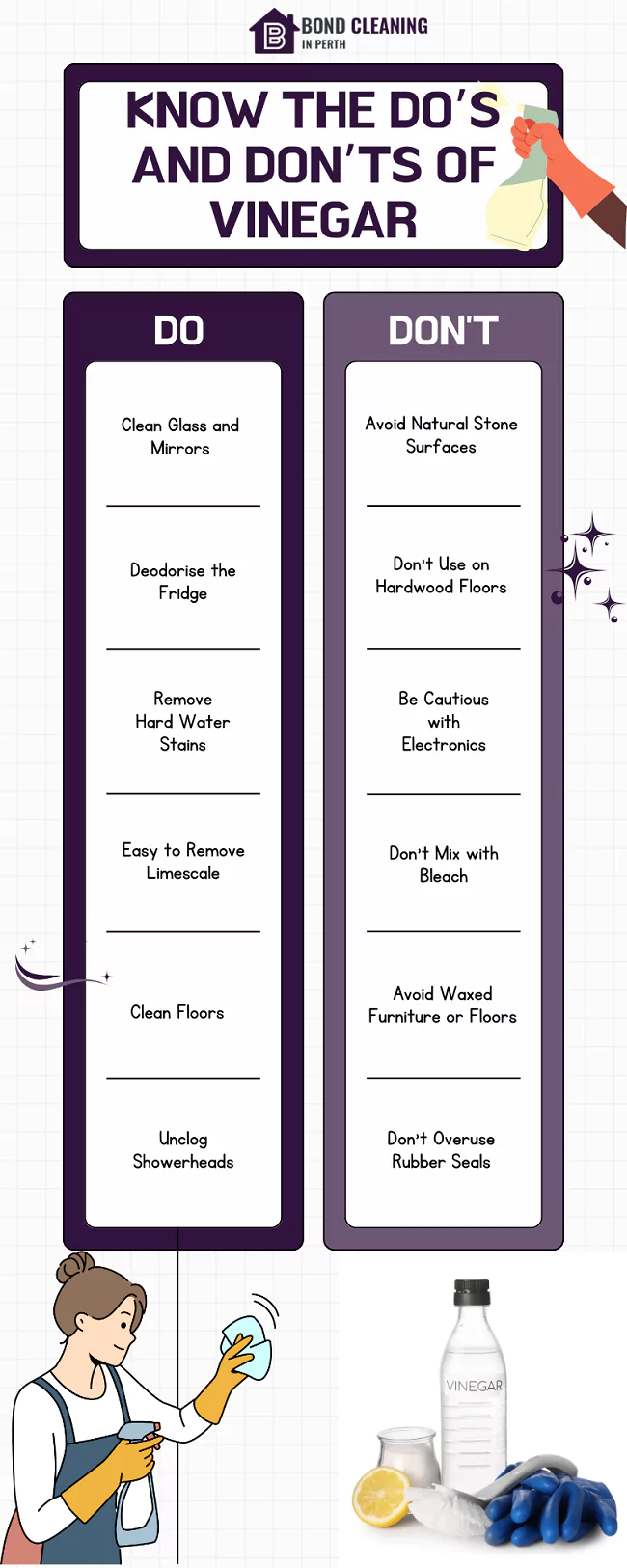Vinegar As A Natural Cleaner: Dos And Don’ts
Natural cleaning solutions begin with vinegar. It is cheap, eco-friendly, and very effective for most cleaning tasks. Vinegar is a versatile and non-toxic cleaning agent. Its high acidity, around 5 per cent, cuts through grease, grime, and mineral deposits. Being antibacterial makes it ideal for household cleaning. Eco-conscious people are choosing vinegar over ammonia-based store-bought cleaners to promote sustainability, and organic cleaning. The best part is that you can prepare multiple cleaning products with this magical ingredient.
However, like any cleaner, it has its limitations. If you’re considering adding vinegar to your cleaning routine, this guide will help you make the most of its benefits while avoiding common mistakes. Ensure you keep the do’s and don’ts in mind as it is a great alternative to chemical cleaners and used by many professional vacate cleaners in Perth.
Hide
Show
]- Do’s: Clean Glass and Mirrors
- Don’ts: Avoid Natural Stone Surfaces
- Do’s: Deodorise the Fridge
- Don’t Use on Hardwood Floors
- Do’s: Remove Hard Water Stains
- Don’ts: Be Cautious with Electronics
- Do’s: Easy to Remove Limescale
- Don’t Mix with Bleach
- Do’s: Clean Floors
- Don’ts: Avoid Waxed Furniture or Floors
- Do’s: Unclog Showerheads
- Don’t Overuse Rubber Seals
- Do’s: Deodorise Drains
- Important Tips to Consider:
- Need Professional Help?
- Wrapping Up
1. Do’s: Clean Glass and Mirrors

Vinegar is perfect for cleaning windows and mirrors. Mix equal parts vinegar and water in a spray bottle. Wipe with a microfiber cloth for a sparkling finish.
2. Don’ts: Avoid Natural Stone Surfaces
Though vinegar is very versatile, some surfaces need to be handled with care. Bigger cleaning challenges, for instance those involved in vacate cleaning Perth, may call for professional cleaners to do the job properly and safely.
However, you should never use vinegar on granite, marble, or any other type of natural stone countertop. Its acidity eats away at the surface and dulls its finish.
3. Do’s: Deodorise the Fridge
Do you have bad odours in your fridge? To neutralise smells without harsh chemicals, wipe down the interior with a mix of vinegar and water.
4. Don’t Use on Hardwood Floors
While diluted vinegar is safe for many surfaces, it’s not ideal for hardwood floors. It can strip the protective finish, leaving the wood vulnerable to damage.
5. Do’s: Remove Hard Water Stains
Vinegar is great for faucets and shower heads. Soak a cloth in vinegar, wrap it around the affected area, and let it sit for several hours. Then, wipe away the buildup.
6. Don’ts: Be Cautious with Electronics
Avoid using vinegar on computer screens, phone screens, or TVs. It can damage protective coatings. Use a screen-safe cleaner instead.
7. Do’s: Easy to Remove Limescale
If you’re moving out, vinegar is a handy tool for refreshing your space. Many professionals Use it to limescale and calcium deposits when performing a thorough Vacate Cleaning Perth. It’s an affordable, eco-friendly solution to ensure your home looks spotless during your final inspection.
8. Don’t Mix with Bleach
Mixing vinegar with bleach creates toxic chlorine gas. Always keep these two substances separate for your safety.
9. Do’s: Clean Floors
For tile and vinyl floors, mix half a cup of vinegar with a bucket of warm water. This will cut through grime without leaving a sticky residue.
10. Don’ts: Avoid Waxed Furniture or Floors
Vinegar can strip wax coatings, leaving furniture or floors dull and unprotected. Stick to wax-specific cleaners for these surfaces.
11. Do’s: Unclog Showerheads
Hard water buildup can clog showerheads. Remove them and soak in vinegar overnight. Rinse thoroughly and reattach for improved water flow.
12. Don’t Overuse Rubber Seals
Prolonged use of vinegar can damage rubber seals, such as those in washing machines or dishwashers. Use sparingly and rinse thoroughly.
13. Do’s: Deodorise Drains
Pour a mix of vinegar and baking soda down the drain to remove odours and minor clogs. Follow with hot water for a fresh-smelling sink.
Important Tips to Consider:
It is good to maintain a clean and shiny abode using proper proportion of cleaning products. Whether using vinegar or any other natural cleaning agent, consider the following tips for sparkling results:
- Test First: Always test a small area before cleaning an entire surface to ensure no damage or discolouration. This can prevent damage and discolouration of surfaces.
- Dilution Matters: Undiluted vinegar is potent. It is good to dilute it for cleaning tasks to avoid over-cleaning or damaging surfaces.
- Use the Right Tools: Pair vinegar with a microfiber cloth, soft-bristled brush, or sponge depending on the level of grime and the nature of the surface.
- Label Your Mixes: If you’re mixing vinegar solutions, clearly label the spray bottles to avoid confusion.
- Store Safely: Keep vinegar away from children and pets, especially in concentrated form.
Need Professional Help?
For stubborn stains or heavy-duty cleaning tasks, vinegar might not be enough. It is always good to hire trained vacate cleaning Perth professionals who come fully-equipped with professional-grade tools and eco-friendly methods to deliver a spotless finish every time.
Know the Do’s and Don’ts of Vinegar

Wrapping up
Vinegar is a powerful and natural cleaning ally when used correctly. Its versatility makes it a must-have for everyday cleaning, but understanding its limitations is crucial to avoid damage. By following these dos and don’ts, you can enjoy a cleaner, greener home with minimal effort.

